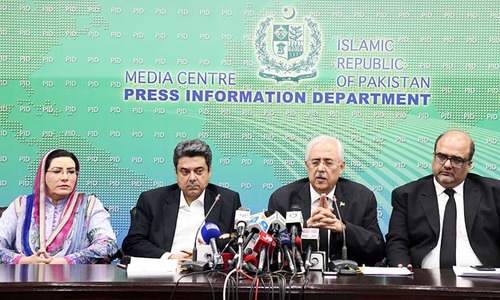AFTER three days of high drama, the system found a solution and a potential impasse was averted. On Thursday, the Supreme Court, rejecting all notifications and summaries on the matter, issued a short order granting a six-month extension to Gen Qamar Bajwa’s tenure as army chief.
The order said the government and parliament should specify the terms and conditions of the service of the COAS through an act of parliament and clarify the scope of Article 243 of the Constitution. Parliament, as per the order, should enact the said legislation within six months. Such a law would be expected to determine the length of the army chief’s tenure — and the question of its extension.
The court order has helped the government come out of the corner it had painted itself into by its inept handling of the issue. The government is chiefly to blame for this needless confusion and controversy over a sensitive matter. It is therefore disappointing to note the prime minister’s tweets blaming foreign enemies and domestic “mafia” whereas the real culprit is the government’s own legal team that was unable to write a notification that could withstand judicial scrutiny.
The ball is now in parliament’s court. The people’s elected representatives have been provided an opportunity by the apex court to frame the legal process pertaining to appointments of army chiefs and the length of their tenure in office.
Given the central role played by army chiefs in Pakistan, and their crucial position within the state structure, parliament must come up with legislation that stands the test of time. This would entail deep deliberation and consultation between the government and the opposition so that all aspects of the issue are debated before the final legislation is drafted.
The process should not be rushed, and parliamentarians should take as much time as they require, within the stipulated period, to produce a law that strengthens all institutions and the system as a whole. In the course of their deliberations, they would also do well to remember that once parliamentary sanction is given to such extensions, it would be difficult to reverse course later.
The opposition has a key role. An issue as important as this must not be politicised. If and when the government reaches out to the opposition, the response should be positive despite the strained relationship. Without a constructive working relationship inside parliament, it would be very difficult to have the kind of debate that is required for the task at hand.
Finally, this paper believes in the strength of institutions. Although the court may have felt it necessary to prevent a sudden vacuum in the army leadership, Gen Bajwa has been given a face-saving opportunity to decide on a course of action that will serve the interests of his institution and the system as a whole — and not that of a single individual.
Published in Dawn, November 29th, 2019













































